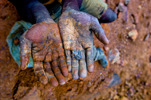
Global Witness released a new report today that is required reading for anyone concerned with the continuing crisis in eastern Congo. The report, entitled “Faced with a gun, what can you do?” provides an in-depth examination of Congo’s mineral trade and details the economic linkages between rebel groups, the Congolese army, and international companies.
Among the highlights of the report, which is based on extensive research conducted in the Kivus last year, are some choice quotes from the field:
- "They don’t want to leave because of the natural wealth. They are like bees swarming on honey. They prefer to die there." – Resident of Bukavu, referring to the FDLR, 26 July 2008.
- "The FARDC have to go through FDLR areas. They negotiate with each other. They agree not to attack each other. They respect each other’s zones. They each administer their own zones and collect ‘taxes’.” – Congolese researcher explaining the arrangements between the FARDC and FDLR in strategic locations in Shabunda (South Kivu). Bukavu, 25 July 2008.
- "Natural resources are not on the table of topics in peace talks. Almost every other issue is. Yet it’s one of the keys to resolution of the conflict." – U.N. official, Goma, 22 July 2008.
Global Witness has been focused on the links between conflict and natural resources in Congo for years, and their research goes a long way toward explaining why violence and insecurity persist in eastern Congo despite the superficial success of the peace process. Not only has greed oftentimes overtaken grievance as the motivation for violence in the Kivus, but the profits from the mineral trade have allowed men with guns to establish entrenched networks that exacerbate political and ethnic conflicts, siphon away the capacity of Congolese institutions to provide security and economic opportunity, and foment public distrust while privately lining the pockets of elites from the Kivus to Kinshasa, Kigali, and beyond.
Moreover, the report correctly notes that by turning a blind eye to the international dimensions of the trade in conflict minerals, companies and governments in the region and around the world continue to add fuel to the fire. As my colleagues John Prendergast and Noel Atama put it in our recent strategy paper: “there will be little chance for peace in Congo until the world figures out a way to purchase that country’s minerals without fueling horrific violence.”
American consumers cannot singlehandedly right Congo’s wrongs. But unless we stop acquiescing to patterns of commerce that profit from Congo’s instability, the efforts of Congolese peace activists will continue to be overwhelmed by the interests of those who control the mines, the money, and the guns.

